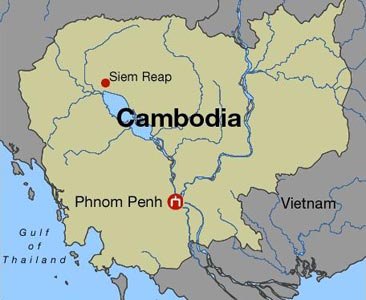Judge: Cambodia's Khmer Rouge tribunal cannot pay its staff
 Phnom Penh- A top judge at Cambodia's UN-backed tribunal said Monday lack of international funding meant the court would be unable to pay its domestic staff salaries this month.
Phnom Penh- A top judge at Cambodia's UN-backed tribunal said Monday lack of international funding meant the court would be unable to pay its domestic staff salaries this month.
Kong Srim, president of the tribunal's Supreme Court Chamber, told a plenary session of tribunal judges in Phnom Penh that the international donor shortfall had put the Cambodian side of the hybrid court in a dire financial position.
"Unfortunately the national side of the court will not have sufficient funds for the staff salaries this month," he said.
"I see this as our most important challenge, as it seems hardly reasonable for judicial officers and staff to be expected to continue working without remuneration."
Five former Khmer Rouge leaders are currently facing trial for their roles in the deaths of up to 2 million people through execution, starvation or overwork during the Maoist group's 1975-79 reign.
Millions of dollars worth of UN funding for the domestic side of the court was frozen in July after a series of allegations that Cambodian staff were forced to pay kickbacks to some of their superiors.
A UN review of the allegations was sent to the Cambodian government in September, but it was made not public.
The UN said funding would be withheld until a satisfactory investigation of the allegations was completed.
The UN side of the court was not affected by the funding freeze, but the domestic side has since relied on tentative funding arrangements with individual donors, such as Japan, Australia, France and the United States.
Peter Taksoe-Jensen, UN assistant secretary-general for legal affairs, met with Cambodian government officials in Phnom Penh last week to discuss the investigation's progress.
"Following the most positive outcome of the meeting between the assistant secretary-general and the deputy prime minister we are confident this problem will be shortly resolved," Kong Srim said.
International judge Silvia Cartwright, who is a former New Zealand governor-general, told the session that the court needed to operate in an open, transparent and "corruption-free" environment.
"The investigating judges have said that we encourage the Cambodian government and the UN to work together to ensure there be no impediment to the court's progress," she said.
The Khmer Rouge tribunal was established in 2006 after a decade of negotiations between the Cambodian government and the UN.
The trial of former Tuol Sleng torture facility chairman Kaing Guek Eav, known by his revolutionary name Duch, began last month and will resume on March 30. (dpa)